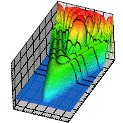Department of Physics and Astronomy: Publications and Other Research

Anthony F. Starace Publications
Document Type
Article
Date of this Version
11-2013
Citation
PHYSICAL REVIEW A 88, 053411 (2013)
Abstract
The carrier-envelope-phase (CEP) dependence of electron angular distributions in double ionization of He by an arbitrarily polarized, few-cycle, intense XUV pulse is formulated using perturbation theory (PT) in the pulse amplitude. Owing to the broad pulse bandwidth, interference of first- and second-order PT amplitudes produces asymmetric angular distributions sensitive to the CEP. The PT parametrization is shown to be valid by comparing with results of solutions of the full-dimensional, two-electron time-dependent Schrödinger equation for the case of linear polarization.
Included in
Atomic, Molecular and Optical Physics Commons, Elementary Particles and Fields and String Theory Commons, Plasma and Beam Physics Commons


Comments
Copyright © 2013 American Physical Society. Used by permission.